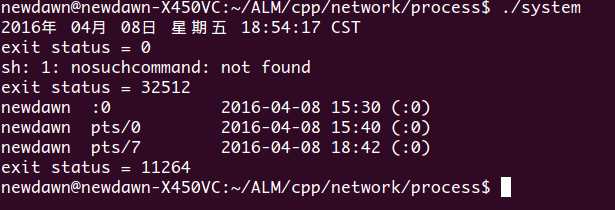标签:
代码如下:
#include <sys/types.h> #include <sys/wait.h> #include <unistd.h> #include <stdio.h> #include <errno.h> #include <stdlib.h> inline int mySystem(const char *cmd) { pid_t pid; if(cmd == NULL) return 1; int status; if((pid = fork()) < 0) status = -1; else if(0 == pid) { execl("/bin/sh","sh","-c",cmd,(char*)0); _exit(127); } else { while(waitpid(pid, &status, 0) < 0) if(errno != EINTR) return -1; } return status; } inline void test(const char *cmd) { int status; if((status = mySystem(cmd)) < 0) { puts("system error."); exit(0); } printf("exit status = %d\n", status); } int main() { test("date"); test("nosuchcommand"); test("who; exit 44"); return 0; }
输出如下:

现在才知道系统的system函数为我们做了那么多的处理。
linux下使用fork,exec,waitpid模拟system函数
标签:
原文地址:http://www.cnblogs.com/Newdawn/p/5369653.html